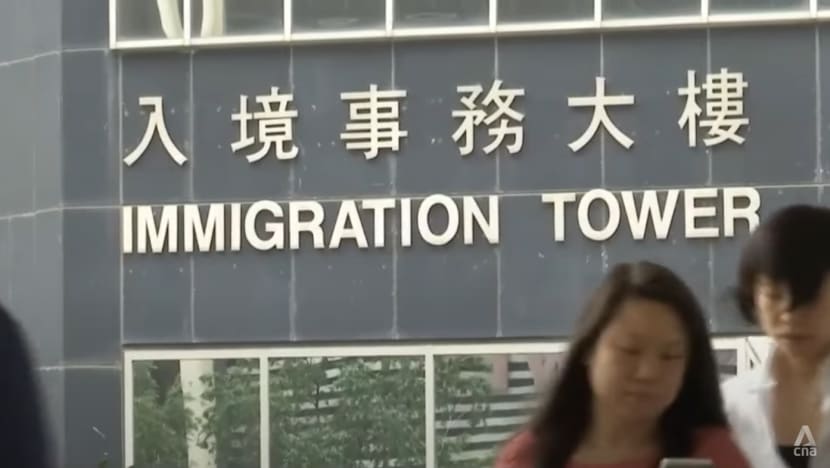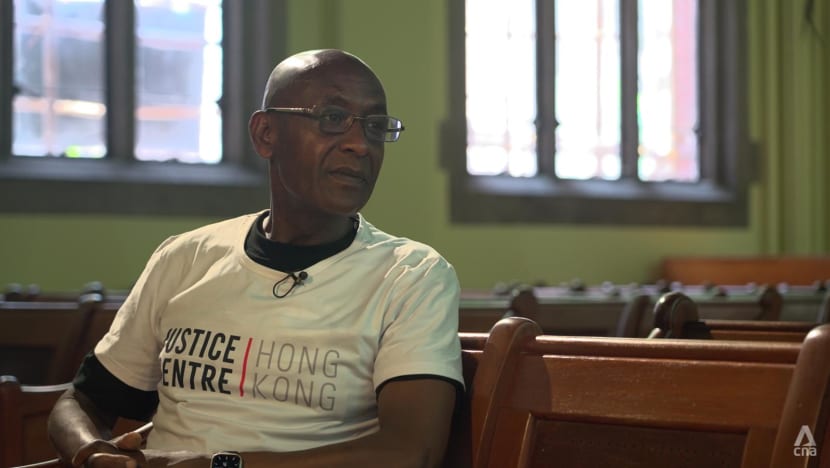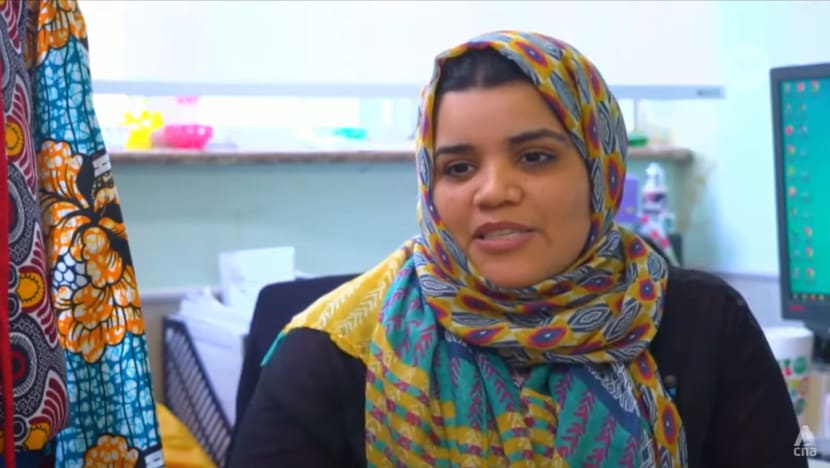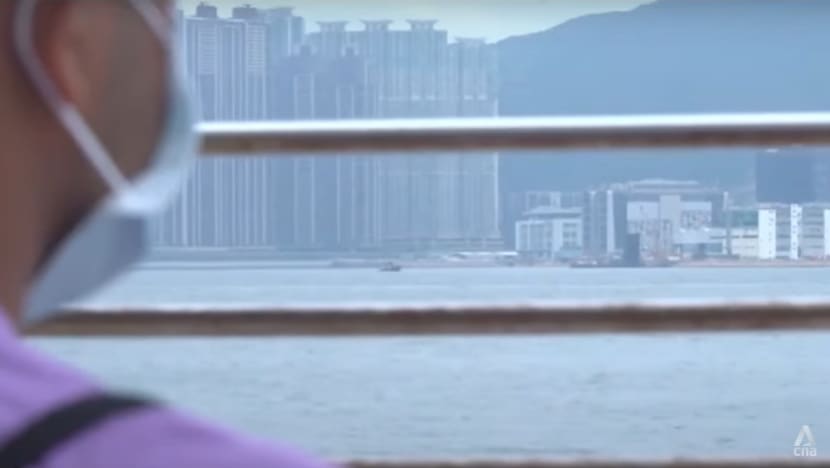‘Not a welcoming situation’: Over 15,000 refugees, asylum seekers lack legal right to live or work in Hong Kong
Refugee children who were born or raised in Hong Kong are also only allowed to attend school after getting approval from the Immigration Department.

The Immigration Tower located in the Wan Chai district of Hong Kong, which houses the city's Immigration Department.

This audio is generated by an AI tool.
HONG KONG: Her family members did not undergo torture or have gunshot scars – that was the Hong Kong authorities’ reason for rejecting asylum seeker Uzma Naveed’s case.
Ultimately, it took a painful eight years for the Pakistani’s non-refoulement claim, which would prevent her from returning home and being liable for persecution, to be substantiated. She spent that time in limbo, not knowing if she would be sent back home.
“You cannot work, you cannot volunteer, you cannot do anything that you want to do as a human being wants to do so,” she told CNA.
“It's (a) really, really hard life as an asylum seeker.”
While Hong Kong does not grant asylum or legally recognise refugees, non-refoulement claims protect those like Ms Naveed from being sent back to a country where they could face torture or irreparable harm.
Ms Naveed, whose last name translates to good news, counted herself lucky to receive the good news last July that she could remain in Hong Kong – the most accessible option when she first arrived.
Out of 29,000 non-refoulement claims made in the last 15 years, only 330 were successful or substantiated.
According to statistics from the Immigration Department, Pakistanis and Yemenis are two nationalities with the highest number of substantiated claimants.
On top of prolonged waiting times for the authorities to make a decision, asylum seekers or refugees – officially referred to as non-refoulement claimants by the government – do not have a legal right to live or work in Hong Kong.
More than 15,000 are currently in this position.
RESETTLEMENT PROBLEMS
Even if a foreigner’s non-refoulement claim is approved, the end of one uncertainty could mean the beginning of another.
For Mr Aimé Girimana, who fled the East Africa nation of Burundi 20 years ago, he does not know when he will get resettled – if ever.
“I never lose hope. Maybe one day, I will be accepted,” he said.
“I know I didn't choose to become a refugee, and unfortunately, when you look at what is going on around the world, no one knows who will be the next refugee.”
Mr Girimana, who turns 60 this year, only had two hours to pack up his life and leave Burundi, after discovering a plot to kill him over his work as a human rights advocate. He has been separated from his family ever since.
Experts said that the long wait for recognition and resettlement comes down to the system changing over the years due to improvements or court cases that reshape interpretations.
Ms Lynette Nam, executive director at non-governmental organisation (NGO) Justice Centre Hong Kong, noted that resettlement matters are processed by the United Nations’ Refugee Agency.
Ms Nam’s NGO provides support to refugees, asylum seekers and other forced migrants in the city.
“A lot of the time, Hong Kong just simply isn’t a priority,” she told CNA’s East Asia Tonight.
“If someone is stuck in Hong Kong as opposed to a refugee camp in Jordan, a lot of the time, it’s a person who is in a refugee camp that is prioritised … I think people really feel that hardship there.”

AWARENESS HAS IMPROVED
Like in Ms Naveed’s case, Hong Kong was among the few places Mr Girimana could enter without a visa. Hong Kong’s relatively open economic interests means it has fewer visa restrictions, which makes it attractive to refugees.
Japan and South Korea are two Asian signatories of the 1951 UN Refugee Convention. Even so, their low acceptance rate of refugees as well as ethnically homogenous societies make Hong Kong a more desirable option.
Mr Girimina told CNA about his shock at being arrested when he arrived two decades ago. People were generally not aware of refugees at the time, apart from knowing there were Vietnamese ones, he said.
“They didn't have any idea, so once you disclose your status, people will run away from you,” he added.
While it is still “not a welcoming situation” in Hong Kong, he said awareness of refugees has increased. More donors have also stepped forward.
Mr Jeffrey Andrews, manager of the Christian Action Centre for Refugees, said some Hong Kongers think refugees are “fake” and “just here wanting to delay their own time here”.
“But actually, they want to move on with their lives. They want to have (an) identity. They want to stop relying on government welfare, NGOs,” he added.
Mr Andrews also said he thought fewer people would seek asylum in Hong Kong after the COVID-19 pandemic.
“But no, we see a lot of North Africans coming in, Egyptians coming in,” he added. “So yes, the political, religious and certain civil wars going on outside do have an effect on Hong Kong.”
SOME EMPLOYERS UNWILLING TO HIRE REFUGEES
Given their inability to legally work or live in the city, refugees and asylum seekers depend on government allowance of about US$400 a month. It is barely enough to cover rent or living expenses, as costs of living continue to rise in Hong Kong.
Getting approval to work is not a straightforward process. They must first find employers who are willing to take them on, before applying for permission to work from the Immigration Department, which will assess their situation on a case-by-case basis.
However, some employers are deterred by a cap of six months on each work contract for refugees and asylum seekers.
According to the Christian Action Centre for Refugees, many of these work placements are in industries like hospitality, recycling, and food and beverage. Refugees who are trained professionals back home are then unable to fully utilise their skill sets.
Even so, they are using the chance to give back to others in need.
Under a special arrangement approved by the Immigration Department, Ms Naveed is now a community outreach coordinator at Christian Action Centre for Refugees. She runs a programme for refugee women where they attend art and culinary activities.
“We have cooking classes, sewing classes, and jewellery-making classes. The women can find different ways to keep themselves engaged. We just want to encourage them to be socially connected with other women, because life as a refugee and asylum seeker can be isolating,” she added.

Behind Ms Naveed’s desk sits a rack full of colourful bags, each unique and intricately handwoven by the women in the programme.
“Whenever we sell these products that they make, they do get a little bit of allowance from all these classes, and they can go home and buy something for themselves,” she said.
“You can imagine how expensive Hong Kong is. When we give them the money for their hard work, they feel like they've earned something.”
Mr Girimana, who was a trained lawyer in Burundi, has now taken on the role of community partnerships officer at the Justice Centre Hong Kong.
He rallies a team of volunteers, who are also refugees, to lead a food distribution drive at Kowloon Union Church every week.
“A good deed is never wasted, so being here, not being able to help my family, I was really motivated by that principle. So let me give my strength and my time to people in need,” he said.
“I know one day there will be somebody who will be helping my family as well, so that's what motivates me.”
REFUGEE CHILDREN’S SCHOOL WOES
Those who flee to Hong Kong with their children face another problem: The children are not allowed to go to school as they have no legal right to remain in the city.
Once they reach the school-going age of six, the Immigration Department may consider their school applications on a case-by-case basis.
From 2021 to end-January this year, a majority – 573 – of about 660 placement requests were approved.
One such young asylum seeker, Adrian (not his real name), fled South Asia with his family when he was six years old.
Despite his illegal status, he could attend school with permission from the Immigration Department. His family’s non-refoulement claims have yet to be substantiated after 16 years.
Adrian eventually managed to get the funding and qualifications to enrol in university, where he studies health sciences.
However, unlike his peers, he cannot take on internships, which is increasingly a criterion to graduate under most tertiary programmes.
Adrian told CNA that without internships under his belt, he cannot offer proof to future employers of any accomplishments in his field – if he can even find an employer willing to take him on.
On the bright side, some colleges have exercised flexibility, and allowed refugee students to take on more research papers and work with their professors.
One such institution that made adjustments was Hong Kong Baptist University, which admitted two refugee students over the last five years. Its academic registrar Sally Ching told CNA that teachers can consider asking such students to work on projects under the supervision of faculty members.

For Adrian, his goal is to get his bachelor’s – and perhaps even master’s – degree, and help as many people as possible.
The 22-year-old speaks fluent Cantonese like most refugee children who grew up or were born in Hong Kong. About 1,000 of them were born there but remain “overstayers” in the eyes of the law.
“I’ve lived here for 16 years, more than any other place in the world that I’ve lived in … I have friends from Hong Kong and I know the native language,” Adrian added.
“So I believe I should be qualified to be a Hong Konger, and I believe I am a Hong Konger.”

















